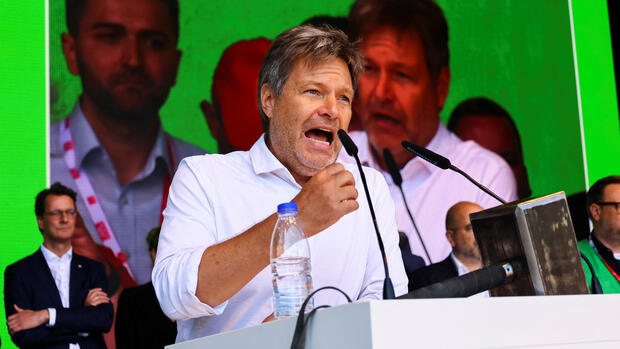Duisburg, Berlin 12,000 steel workers from Thyssen-Krupp received the Federal Minister of Economics Robert Habeck (Greens) on Wednesday with boos. He had come to Duisburg for a demonstration by IG Metall. And it was again about one question: When will the state support the group financially in the transition to green steel?
Habeck had positive news to announce on Wednesday. The formal decision from Brussels is not yet there, explained Habeck. But he confirmed what had become known from ministry circles on Tuesday evening: At the beginning of the week, the EU Commission sent a letter to the federal government, which basically confirmed the payment of the two billion euros in funding.
For around two years, the EU Commission has been examining whether the federal government and the state of North Rhine-Westphalia can support the steel group with two billion. After months of waiting and several visits to the Thyssen-Krupp steel site in Duisburg, Habeck called out to the workers on Wednesday: “I’ve worked for a year and a half for this and will continue to do it.” Brussels can be expected in the next few weeks.
With the large-scale demonstration in Duisburg, the Thyssen-Krupp workers wanted to put pressure on the federal government. The representatives of IG Metall see 27,000 jobs in the steel sector at risk if the funding project and the construction of a direct reduction plant for the production of green steel fail.
Thyssen-Krupp cannot finance plant construction alone
The total cost of the project is around 2.7 billion euros, according to corporate circles. With the planned funding of around two billion euros, the federal government is to provide aid of 1.3 billion, the state of North Rhine-Westphalia is supporting the industrial group with funding of 700 million euros. The group itself has to pay for 700 million.
The process, which has dragged on for two years, is proving difficult. Disagreements between Berlin, the EU Commission and Thyssen-Krupp had so far delayed the approval of the funding decision.
Habeck put on an IG Metall T-shirt on stage. The inscription: “Standstill has never moved anything.”
(Photo: Reuters)
The so-called direct reduction plant is scheduled to go into operation at the end of 2026 and produce 2.5 million tons of steel annually – first with natural gas and then with green hydrogen, i.e. hydrogen produced by electricity from renewable sources. Since the Economics Ministry had agreed to start the project early, Thyssen-Krupp was able to start work at the Duisburg site.
The step of reaching a basic agreement between Brussels and Berlin about the funding and its amount before the actual approval is granted is unusual. Those involved did so because the industrial group needed the security to be able to maintain contracts for its transformation project and conclude new ones, government officials said.
Jürgen Kerner, Vice President of the Thyssen-Krupp Supervisory Board and executive board member of IG Metall, confirmed at a press conference before the rally: “It is a reality that the contracts will otherwise be terminated, because Thyssen-Krupp cannot finance the plant construction itself.”
>> Read here: Thyssen-Krupp plans to list its hydrogen subsidiary Nucera before the summer
Workers welcomed the progress being made in the process. “However, we also hear that the conditions for when these 1.3 billion may flow from the federal government are not yet clear,” said Kerner. The payout is subject to conditions.
Trouble between Berlin and Brussels: “Always the same plague”
The anger of the Thyssen employees is also based on an envious look at Lower Saxony: the EU Commission had already approved a funding decision for the competitor Salzgitter in October 2022.
According to Habeck, the fact that Thyssen-Krupp is taking much longer is not just to blame for politics. In Duisburg he said: “Yes, the funding notice has not yet arrived. Why? Because the application was expanded last year.” New documents had to be submitted and further checks carried out in Berlin and Brussels.
But politicians are also to blame. Commission circles accuse Berlin that missing documents would have delayed the process. Ministry groups, on the other hand, criticize Brussels, as is so often the case with state aid approval procedures. It is “always the same plague”.
The so-called direct reduction plant is scheduled to go into operation at the end of 2026 and produce 2.5 million tons of steel annually.
(Photo: imago images/simme)
Minister Habeck is said to have personally influenced the commission several times. Green economic politician Felix Banaszak is also targeting Thyssen-Krupp: “But not only the federal government and the state of North Rhine-Westphalia have to be behind the transformation, but also the company itself.”
Thyssen-Krupp deep in the red
An agreement would create planning security for the group in difficult times. Thyssen-Krupp not only slipped deep into the red in the second quarter of the 2022/23 fiscal year with a loss of 223 million euros.
According to information from the Handelsblatt, the search for a partner for the steel division has also been difficult for years from business and financial circles. The group cannot pay for the investments required for green steel production on its own.
Because the direct reduction plant is only the first step in the transformation of the Duisburg location. By 2030, 25 percent of steel production must come from climate-neutral processes. For everything else, the company needs more state help, according to trade unionist Kerner: “If we don’t make the first step, we don’t even need to talk about all the others.”
The other two well-known steel manufacturers in Germany, Arcelor-Mittal and Saarstahl, have also not yet received funding approval. All in all, it is about a state subsidy of six billion euros for the four steel companies.
More: Funding chaos at Thyssen-Krupp – Green transformation hangs in the balance
